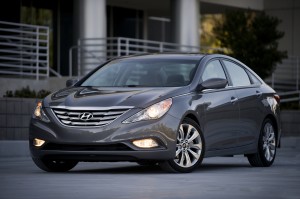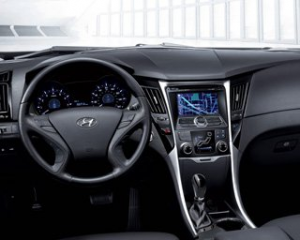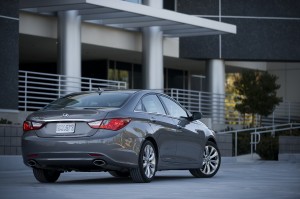Instrumental
Hyundai’s Sonata 2.0T Limited Plays Well
You couldn’t really call Hyundai’s 2011 Sonata the downbeat in the musical score that accompanies the manufacturer’s current success. After all, the 2011 model represents the fifth-generation Sonata. But if not the opening beat, the new Sonata is perhaps the key note in the South Korean maker’s arrival as a mature full-line car company. As instrumental as it is to Hyundai sales, the Sonata had better play well.
American buyers apparently like the music. Hyundai sales were up 32 percent for March 2011 on the strength of its Sonata and Elantra sedans. Of the two, the Sonata topped the playlist with 22,894 sales. That’s entirely understandable given this car’s execution and price. I drove the top-of the-line 2.0T Limited which, with all the bells and whistles, stickered for $30,000. If you’re heart’s not set on having a navigation package, you can trim the bottom line to less than $28,000.
Or, you could opt for the 2.0T SE model which gives you the same well-crafted 274 horsepower 2.0 liter turbo four cylinder but leaves out some premiums like the nav system, rear backup camera, Infinity audio system, paddle-shifters and an “active eco” button which modifies transmission shift patterns to improve fuel economy by seven percent – all of which can be forgone with little regret. With a starting price just south $25,000 the 2.0T SE may be just the ticket for budget-minded enthusiasts.
Either way, the first thing you’ll notice is the Sonata’s styling. Personally, I find the Sonata’s sister sedan, the Kia Optima, more appealing but the Sonata’s angry insect look is growing on me. The car’s dynamics impressed right away. In its class you’ll find little which out-accelerates to Sonata 2.0T (0 to 60 mph in 6.5 seconds) and with optional 18-inch wheels and tires, the Limited is up for some spirited driving. There are places in the performance envelope where V6-equipped Accords, Altimas, or Camrys might have an edge on the Sonata 2.0T (though not on fuel efficiency) but overall, its twin-scroll turbo four trades little for the absence of two extra cylinders. A snappy bit of garage bravado can even be dropped in conversation when noting the Sonata 2.0T’s electronically-limited 153 mph top speed.
Cornering is handy though the steering seemed heavier than necessary at first. That feeling diminished in the course of a week but overall steering feel did not improve. According to Hyundai, 2.0T steering calibration is different from normally-aspirated Sonatas but it still doesn’t rise to the level of better sports-sedans. Without track time, we couldn’t explore the Sonata’s electronic stability control/brake force distribution limits but a head-to-head autocross run against Accord/Camry/Altima would be good times.
There are good times to be had inside. The Limited’s leather seating is generally comfy though the front passenger seat lacks power and, more importantly, lumbar adjustment. The dash/instrument presentation is efficient with fewer buttons than in the Optima though I find the latter’s a more attractive layout. The rear seats are a fine place to be with adequate legroom though folks over six feet tall will find rear headroom a bit short. Visibility is generally good and interior noise levels are peaceful. A full complement of front/side airbags are in residence though airbag placement in the A-pillars requires a thickness, combined with the rake of the pillars, which can block visibility.
The Sonata shares the same roomy trunk (16.4 cu.ft.) as the Optima but owners will want to take note of the rear speaker enclosure which protrudes from the bottom of the rear parcel shelf. Overall, the car’s daily functionality is right where you’d want it to be. Along with the turbo zip, the Sonata’s 22 city/33 highway fuel economy on regular unleaded makes it an efficient commuter.
So multi-tasked are they that we ask middle-market, mid-size sedans to do everything reasonably well. That makes them a daunting engineering and styling challenge for any company. The fact that Hyundai has executed the Sonata in such a competent and relatively sporting fashion at such a price is true testament to its status as a sophisticated global competitor. The Sonata is instrumental in that.
The Specs
Price as tested: $30,000
Engine: 274 hp, 2.0 liter twin-scroll turbo four cylinder
Curb weight: 3452 pounds
Fuel Economy: 22 city/33 highway



Leave a Reply